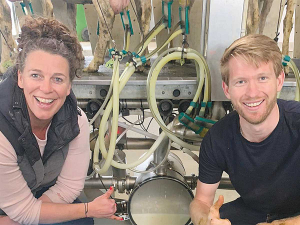Maui Milk achieves grass-fed certification in NZ
Sheep milk processor Maui Milk has achieved grass-fed certification of milk supply against the AsureQuality Grass-Fed Scheme.
 CEO Leah Davey and Business Manager Tom Woutersen pleased to see milk flowing on a new Waikato conversion.
CEO Leah Davey and Business Manager Tom Woutersen pleased to see milk flowing on a new Waikato conversion.
Sheep milk company Maui Milk is looking for new farmer suppliers as demand soars.
The company has taken on four new independent suppliers in Waikato this season to complement milk from its own farms.
Maui Milk general manager operations Peter Gatley says the company needs a lot more milk to satisfy demand from sheep infant formula customers.
One of the new conversions is a greenfield site development on a sheep farm; others involve fitting out existing herringbone sheds on dairy farms.
Gatley says the dairy farm conversion model, located within an hour’s drive of the powder plant at Innovation Park, is expected to be the backbone of industry growth.
He points out that there are 3800 dairy farms in the Waikato, with most able to incorporate sheep milking.
“Even the smaller ones have sufficient scale for sheep milking. They have a lot of milking infrastructure suitable for dairy and sheep – topography, fertility, small paddocks, races, water and effluent system,” he told Rural News.
“You can milk your cows in autumn and have the ewes underway in spring.”
Gatley said there are many reasons for farmers to consider the change.
Payout is based on total milk solids and equates to about $3/litre.
“At 15 to 20 ewes per ha, and 200 to 300 litres per ewe, even the lower end of the scale exceeds milk income from cow dairy,” he claims. “Farmers like the stability of pricing on rolling three-year contracts.”
Not surprisingly, environmental challenges feature strongly in thinking. Overseer calculations generally show sheep milking to have a considerably lighter footprint than cow dairy.
Gatley says some farmers see parallels with goat milking in terms of both financial and environmental issues, but sheep milking enables them to capitalise on their experience in pastoral farming, without the need to tie up capital in barns and machinery.
Shares are not required either, but supply rights will be assigned to protect the interests of early adopters.
Gatley says succession planning is a big factor in some of the conversions, with the new generation happy to innovate and drive rapid productivity improvement while supplying an ultra-premium product category.
He says interest is also being expressed by those seeking a foot in the door via equity partnerships or sharemilking agreements.
Tom Woutersen, Maui Milk manager responsible for new supply, says there are some very capable young farmers looking to sheep dairy as a possible route to farm ownership.
“We also know there are a lot of farm owners nearing retirement age. Some want to retain an interest in the farm but recognise it’s time for someone else to take over the day to day management.
“We’re happy to match those with the makings of a good team”.
New Maui chief executive Leah Davey joined the company from a multi-national ingredients supplier to the infant formula industry. She recalls she immediately saw the opportunity.
“The international market is huge and growing, but all of the big players are looking for a point of difference,” she says.
“A2 and the goat product have shown the way but now we have something that ticks every box for the demanding high-end consumer. In its natural form sheep milk contains about 50% more nutrient than cow or goat milk.
“Like goat milk it is easy to digest, but it has better flavour, and it’s free-range and pasture fed.
“All lambs are reared, and many are reared on their mothers. Consumers love this concept and it has a lot of appeal to farmers too.”
The World Wide Sires National All Day Breeds Best Youth Camp Best All Rounder plaudit has become family affair, with 2026 Paramount Cup winner Holly Williams following in her sister Zara's footsteps.
DairyNZ is giving New Zealand farmers a unique opportunity to gain hands-on governance and leadership experience within the dairy sector.
Herd improvement company LIC has posted a 5.2% lift in half-year revenue, thanks to increasing demand for genetics.
According to the latest Fresh Produce Trend Report from United Fresh, 2026 will be a year where fruit and vegetables are shaped by cost pressures, rapid digital adoption, and a renewed focus on wellbeing at home.
The Roar is a highlight of the game hunting calendar in New Zealand, with thousands of hunters set to head for the hills to hunt male stags during March and April.
OPINION: The past few weeks have been tough on farms across the North Island: floods and storms have caused damage and disruption to families and businesses.

OPINION: Meanwhile, red blooded Northland politician Matua Shane Jones has provided one of the most telling quotes of the year…
OPINION: This old mutt has been around for a few years now and it seems these ‘once in 100-year’ weather…